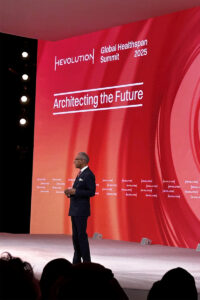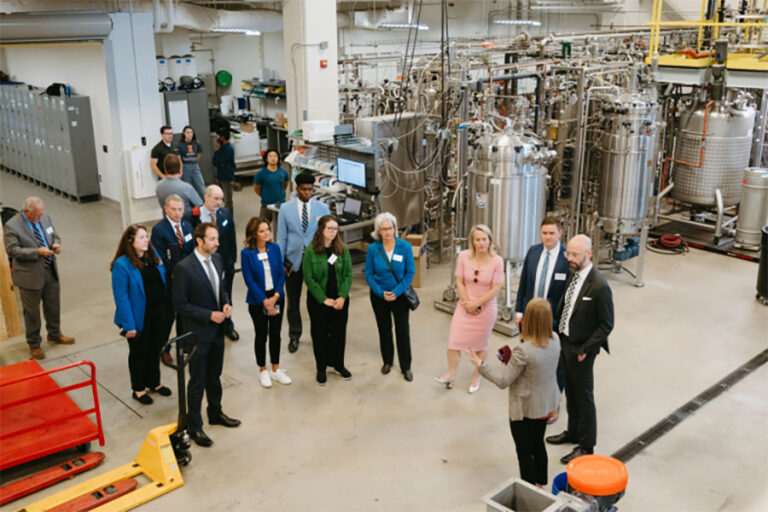
Our world is on the brink of a health revolution. As global life expectancy rises, the real challenge isn’t just living longer but living healthier. Hevolution Foundation, a global nonprofit dedicated to extending healthy human lifespan through scientific research and investment, has placed itself at the heart of this shift, and its recent Global Healthspan Summit in Riyadh has cemented the city as the epicenter of health innovation.
In just a few years, Hevolution has redefined the conversation around aging. It has already committed over $400 million to aging research and biotechnology investments, driving the field forward with unprecedented urgency.
“Most people that we’ve surveyed around the world actually don’t want to live longer just for the sake of living longer,” says Dr. Mehmood Khan, Hevolution’s CEO. “One in two physicians regularly get asked by their patients about lifespan and healthspan. This is no longer a discussion for a few experts. Every one of us is a consumer—we all hope we don’t become patients.”
This consumer-driven demand and awareness of healthy longevity science is fueling record investments. In the past year alone, venture capital funding in this field has more than doubled to over $75 billion. Investors aren’t just backing concepts; they are writing larger checks, with the average deal size increasing by 77%. These trends were at the core of discussions in Riyadh, where Hevolution convened over 2,500 leading scientists and researchers, policymakers, investors, and biotech entrepreneurs from around the world.
“Imagine adding life to years, not just years to life. That’s the revolution we’re leading.”
Dr. Mehmood Khan, Hevolution CEO
Hevolution’s role extends beyond funding; the foundation is reshaping the global research ecosystem by eliminating barriers that have slowed progress for decades. As a nonprofit, it reinvests all returns into the field rather than extracting profits. “At Hevolution, we’re not just funding research—we’re creating a new model for accelerating breakthroughs,” Dr. Khan explains. This includes backing early-stage biotech startups, supporting more than 250 scientists globally, and championing cross-sector collaboration.
One of the summit’s highlights was the Saudi Biotech Pitchfest, where emerging health-tech firms showcased disruptive solutions aligned with Saudi Arabia’s National Biotech Strategy. The winners—Proteinea, specializing in drug development, and Twinn Health, using AI for medical imaging—represent the kind of innovation that Hevolution is determined to scale.
Beyond individual breakthroughs, the summit underscored a broader shift: healthy longevity is no longer a niche pursuit of academics and futurists. It is a strategic priority for governments and investors alike. Extending healthspan has profound economic implications, with studies suggesting that reducing the period of illness at the end of life by just one year could unlock trillions in global GDP. “This isn’t just about healthcare,” Dr. Khan says. “It’s about building a healthier, more sustainable economy and society.”

Saudi Arabia’s Vision 2030 places health and well-being at the center of its transformation strategy, recognizing that a thriving economy must be built on a foundation of a healthy population. Hevolution’s leadership in healthspan science further cements Saudi Arabia’s role as a global innovation hub in healthspan research. By prioritizing preventive healthcare and technological advancements, Saudi Arabia is positioning itself at the forefront of the future of aging science.
The summit also served as a catalyst for global partnerships. Hevolution has launched collaborations with leading research institutions, pharmaceutical companies, and technology firms to accelerate drug discovery, enhance data-sharing initiatives, and drive forward ethical considerations in longevity science. These partnerships extend beyond the lab; they are actively shaping policies that can make aging research more accessible and impactful on a global scale.
A key takeaway from the event was the role of artificial intelligence in the future of healthspan science. AI-driven breakthroughs in drug development, early disease detection, and precision medicine were widely discussed, with Hevolution at the forefront of integrating these innovations into aging research. Machine learning is now playing a critical role in identifying biomarkers for aging-related diseases, significantly shortening the time it takes to bring new therapeutics to market.
Another emerging theme was global accessibility and equity in healthspan. Discussions emphasized the need to ensure that breakthroughs in aging science reach diverse populations, not just those in wealthier nations. Hevolution’s approach—funding promising therapies without prioritizing profits—positions it as a leader in making healthspan accessible for all.
Dr. Khan emphasized that the real measure of success is not just scientific progress but tangible improvements in people’s lives. “We don’t just want to add years to life; we want to add life to years,” he said. “The breakthroughs we are working on today will shape the way future generations experience aging.”
As Riyadh emerges as the global center for healthspan innovation, Hevolution is proving that aging can be redefined—not as a period of inevitable decline but as a new frontier for human health. The foundation is not just extending years of life—it is ensuring those years are filled with vitality, independence, and opportunity. And, as Dr. Khan puts it, “We’re just getting started.”









